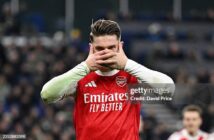In the second half of our look back at the Premier League bosses’ playing careers, there are three Champions League winners, dozens of medals and hundreds of football league appearances.
One current manager even played under another, fifteen years ago – but again, some were always destined to reach greater heights off the pitch.
Here are the second ten:
Pep Guardiola (Manchester City)

credit: FC Barcelona
Holding-midfielder Pep was a crucial cog in Johan Cruyff’s Barcelona side that won the 1992 European Cup and La Liga four years in a row (1991 to 1994), after coming through the youth ranks at La Masia.
As captain Guardiola went on to win two more league titles in the late 1990s, as well as two domestic cups and the 1997 Cup Winners’ Cup.
He finished his career with stints in Italy, Qatar and Mexico, having gained 47 caps for Spain.
Ole Gunnar Solskjær (Manchester United)

credit: Telegraph
Solskjær averaged over one goal per game in the Norwegian lower leagues, which earned him a move to Molde and ultimately Old Trafford – where the Baby-faced assassin won six Premier League titles between 1997 and 2007.
The striker famously scored in the 93rd minute to complete Manchester United’s dramatic late comeback against Bayern Munich in Barcelona and win the 1999 Champions League, securing the Treble.
Steve Bruce (Newcastle United)

credit: Daily Express
After spending most of the 1980s at Gillingham and Norwich – where he won the 1985 League Cup and 1986 Second Division – Bruce was snapped up by Sir Alex Ferguson.
He went on to win three Premier League titles in Manchester, as well as three FA Cups and the European Cup Winners’ Cup, but the centre-back never played for England.
Daniel Farke (Norwich City)

credit: Daily Mirror
Farke spent his time on the pitch in the lower, regional levels of the German pyramid as a slow striker, but had a good goalscoring record for clubs including Lippstadt (three times), Meppen and Paderborn.
Chris Wilder (Sheffield United)

credit: BT Sport
The Sheffield United fan started his professional playing career at right back with his boyhood Blades.
He left to spend four years at Rotherham, before single seasons at Notts County and Bradford, and finished his career at Halifax after a brief stint on the south coast with Brighton.
Ralph Hassenhüttl (Southampton)

credit: Laola1.at
As a central striker, Hassenhüttl won three consecutive Austrian titles and two cups with FK Austria Wien in the early 1990s, before another league win at the club now known as Red Bull Salzburg in 1995.
He scored three goals in eight appearances for the Austrian national team and finished his career with spells in Belgium and the German 2. Bundesliga.
José Mourinho (Tottenham Hotspur)

(front-right) credit: Sun
The Special One lacked physicality and never excelled in his midfield role at Rio Ave or Belenenses (both coached by his dad Félix), Sesimbra or Comércio e Indústria – José retired to focus on coaching after just a few years.
Nigel Pearson (Watford)

credit: Middlesbrough FC
After six unremarkable years at Shrewsbury, Pearson moved to Sheffield Wednesday – he captained them to promotion to the top tier and lifted the League Cup, both in 1991.
The defender missed then missed both domestic cup finals in 1993 after breaking his leg, before moving to Middlesbrough.
At the Riverside, Pearson won two promotions to the Premier League and picked up three more runners-up medals (1997 FA Cup, 1997 and 1998 League Cup).
David Moyes (West Ham United)

credit: BBC
Moyes started out at a youth team in Iceland and picked up a title medal at Celtic early in his career, before moving on to play for Cambridge, Bristol, Shrewsbury, Dunfermline, Hamilton and Preston – the centre-back made over 500 appearances.
Nuno Espírito Santo (Wolverhampton Wanderers)

credit: Sky Sports
Nuno spent most of his career as a back-up or cup goalkeeper, making only around 200 appearances over 18 years – most famously warming the bench as Mourinho’s Porto won the 2004 Champions League.
The Portuguese stopper collected plenty of medals and also had spells at clubs including Vitória Guimarães, Deportivo La Coruña, Osasuna and Dynamo Moscow.
![Prost International [PINT]](https://prostinternational.com/wp-content/uploads/2021/08/PINTtFontLogoRoboto1536x78.jpg)



